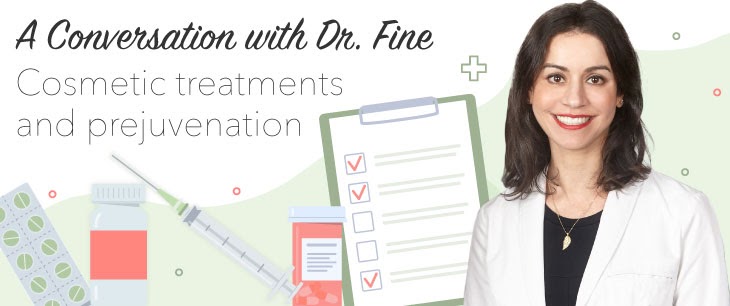“Ask My Derm” with Dr. Lauren Fine
Q: When should I schedule my cosmetic consultation? Is there a certain age I should start looking into wrinkle treatments?
Dr. Fine: There is really no one or right answer to this question. Skin type, genetics, sun exposure, and other environmental factors contribute to skin changes which we think of as “aging”. I tell my patients, when you look in the mirror and see something that is starting to bother you it is the right time to talk to your Board-Certified Dermatologist about treatment options. While not every issue has an easy solution, addressing concerns such as wrinkles, fine lines, or volume loss early will most definitely lead to the best and most natural results.
Q: How do I know which wrinkle treatment is best for me?
Dr. Fine: Not all wrinkles are the same! Lines that you start to see on the upper face like on the forehead, between the eyebrows and around eyes are often in areas where we see muscle movement, so neuromodulators, like botox or dysport, are very effective since they relax muscle. We refer to these wrinkles as dynamic rhytides. When the muscle is not as active, the lines will soften and this can be done very effectively without making someone look frozen or unnatural. Wrinkles on other parts of the face can also be due to loss of collagen and elasticity of skin, sun damage, as well as other factors. A combination of skin care, treatments that help restore volume and lasers that can resurface skin, can all be effective at treating wrinkles. Having an intricate understanding of the aging process on a cellular level by a skin expert is imperative in finding a treatment that is right for you. There is no “one size fits all” approach to treating wrinkles.
Q: If I start preventative wrinkle treatments can I do other cosmetic treatments?
Dr. Fine: For sure! There are so many benefits to addressing these concerns early. Not only will you get better, more natural results, but starting a routine of in-office treatments for wrinkles often have long-term benefits such as collagen stimulation. The aging process of skin begins in the mid 20’s, meaning that collagen production decreases and the elasticity of skin begins to change at this time. Also, with neuromodulators, the longer a muscle is “relaxed”, the less strong it will be over time, so dynamic wrinkles that we see on the upper face will never get as “etched in” or deep over time. This can help yield more permanent results.
Q: Would wrinkle treatments be best for my acne scarring? Or would I look into filler or laser treatments?
Dr. Fine: Acne scars are like snowflakes. No two are the same! Treatment of acne scarring first involves an accurate assessment of the type of scarring present, as well as factors such as skin tone and type and adequate control of acne flares. I like to tailor scarring treatments to the individual which often means using multiple treatment modalities and treating different parts of the face differently, depending on the type of scar involved. In general, lasers that deliver specific energy wavelengths deeper into the skin will help stimulate new collagen and will help scars improve over time. But skin tone and degree of scarring will determine what type of laser would be the best choice, and any laser treatment is usually done as a series (meaning there is often no one-and-done treatment). Other treatments I like include a procedure called cross-chemical reduction using TCA (a skin peeling agent) for deeper “ice-pick” scars, microneedling, subcision, and filler injections. I almost always combine treatments to yield desired results.
Q: Why would someone get filler vs laser treatment for acne scarring?
Dr. Fine: Not all types of scars respond well to fillers. It also depends on the degree of scarring involved and the number of scars looking to be treated.
Q: Does my skin have to be blemish free to receive acne scarring treatments?
Dr. Fine: Ideally acne should be well-controlled prior to starting a treatment regimen for scarring. Active acne that is leading to scarring often involves treatment with both oral and topical medications. To better understand what treatment is right for you, we recommend calling our office to schedule an appointment with me, Dr. Lauren Fine, or any one of our Board-Certified Dermatologists. Our phone number to call or text is 312-245-9965.


